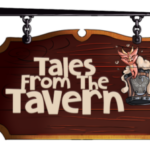First in a two-part series on meta-gaming by @TTBenjamin1, read part two here
The term meta-gaming has expanded so far as to be essentially useless. I don’t want to dwell on definitions and semantics because that kind of discussion is exactly how we got here. I do want to kick off with an overview of how terms like meta-gaming are typically used.
Meta – colloquially seems to be the word for a thing which references or is aware of itself. You open the door to the final chamber and see four friends sitting around a table playing a dice game, that’s a meta joke.
The Meta – usually refers to the emergent properties of how a game works due to its mechanics but not necessarily based on the intent of those mechanics. In card games like Magic: The Gathering, the meta might refer to which decks are dominant and which decks counter those decks. In TTRPGs, the meta might refer to the fact that wizards are considered “better” at higher levels because of their versatility and effectiveness with high level spells.
Meta-gaming – the classic example of meta-gaming is reading ahead in the module so you know what’s coming and where the secrets are. It has expanded since then to include the use of player knowledge to gain an in-character advantage. The most common example is the “trolls are weak to fire” scenario. It’s common knowledge among players that you need fire to kill a troll… But do the characters know that?
Recently, the conversation has exploded around meta-gaming because players and GMs have begun to interpret it more expansively. The definition of meta-gaming has morphed into “anything having to do with game mechanics, or referencing game mechanics out of character”.
Here’s a common example that maybe you’ve seen before. In fact I think it was a gag on The Adventure Zone.
Cleric: Okay, does anyone need healing?
Fighter: Yeah I’m only at 10 hit points
DM: You don’t know what hit points are
Fighter: On a scale of 1 to 37 I’m a 10, health-wise
Where is the line then? Well, it’s fuzzy, but I believe that the example above is just gaming. It’s just using the mechanics of the game completely as intended. It’s out of character, sure, and if you have a table that’s really, really, into immersive role play there are ways to have that interaction without talking mechanics, but it’s not meta-gaming, it’s just gaming.
All of this whinging over the meaning of the term meta-gaming would be pointless if not for two cultural touchstones of the ttrpg world, particularly in D&D and its derivatives.
- Meta-gaming = Bad and therefore anything which can be called meta-gaming is bad
- The line is drawn exclusively by the GM, who has the last say.
These two cultural mores when put together create the above gotcha scene where the GM tries to enforce meta-gaming boundaries and the player claps back at the silly ruling. However, if you’re familiar with how too much power in a malicious GM’s hands can result in terrible table experiences or even harm, you’ll see how this can all sum up to yet another tool to be misused by bad actors.
A functional way to define Meta-gaming
I’m not going for a hard dictionary definition here, I’m trying to add an important dimension to how we understand meta-gaming in a way that is functional and points at the real problem rather than inventing weird boundaries. It all comes down to one word: Intent.
Currently if you ask someone what meta-gaming is, they’ll say something like “Using out-of-game-knowledge in game”. But that’s going to quickly land you in the territory of absurdity because the simple fact is, we cannot suppress everything we know and method act our way into perfect character knowledge. Veteran players will know trolls are weak to fire. Anyone who has seen a zombie movie knows you have to shoot them in the head.
This leads us to weird scenarios where a party is fighting a troll, everyone botches their lore check… And then what? How many turns of useless flailing must elapse before it’s acceptable for someone who already knows the answer to use the appropriate tool for the job? If the characters don’t know you have to shoot the zombie in the head do you have to wait for a critical hit? Luck? Random limb–damage roll that happens to hit the head? Is that even fun at that point?
Let’s swing back to the other side of the spectrum, the Iron Golem. Most veteran D&D players would know they’re immune to magic. Someone might intuit you could use a rust spell on them for damage and make whole to heal them. That’s all reasonable. But only by either having fought them, run them, or peeking in the monster manual would you know they’re vulnerable to slow. Someone immediately jumping to that conclusion means one of those three cases is true. In this case, that might be spoiling a fun, dramatic experience for those that don’t know. I’d call that meta-gaming.
The key word is intent. Doing things like looking up stat blocks, reading ahead in the module, or building specifically to exploit a flawed mechanic with the intent to gain an edge in game are clear cases of meta-gaming. Spoiling the fun by rattling off your knowledge of less common monsters is meta-gaming. Knowing common information about common monsters, optimizing your character based on what you think is fun and effective, or nudging your party away from dire harm because you’ve played through the module before is not really meta-gaming. And even if it is, it’s not malicious, so why call it that?
In this case, you might describe meta-gaming as “Intentionally seeking or using knowledge you shouldn’t have to get an advantage in game”. That’s a description that is useful and describes the actual problem. Almost everything other than that is not harmful, or is not intentional, and is therefore not worth worrying about.
Conclusions
Arguing over definitions is not helpful. Focus on what is or is not useful and good for your game. Trust your gut.
Be upfront with your approach to meta-gaming at your table. Especially if you are the GM. Don’t just assume everyone knows what that word means, because many people use it differently.
TTBenjamin is a game designer and Actual Play producer/performer. You can catch him on Twitter @TTBenjamin1 or @great_lawful







Great article.